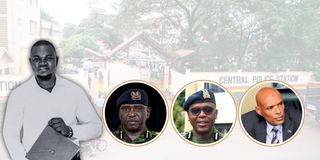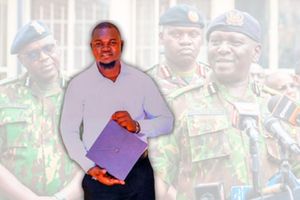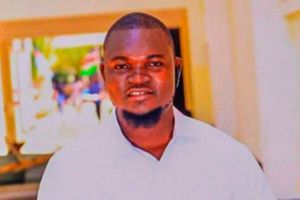
Albert Ojwang, who died at Central Police Station, Nairobi, and (from left) Inspector-General of Police Douglas Kanja, Deputy Inspector-General Police Eliud Lagat and DCI boss Mohamed Amin.
Police chiefs are under pressure to resolve the mysterious death of Albert Ojwang—a Voi-based teacher and blogger—while in police custody, an incident that has sparked nationwide outrage.
Mr Ojwang was arrested on Saturday afternoon in Homa Bay over allegations of false publication following a complaint by Deputy Inspector-General (DIG) of Police Eliud Lagat.
Directorate of Criminal Investigations (DCI) boss Mohammed Amin is in the spotlight, too, as it is his detectives who investigated Ojwang and arrested him from his rural home on Saturday.
Mr Ojwang was arrested alongside Mr Kelvin Moinde following the investigation by detectives from the DCI’s Serious Crime Unit and Cybercrime Unit, according to police sources.
Four officers from the Serious Crime Unit drove the two to DCI headquarters in Nairobi on Saturday evening. Thereafter, police say, Ojwang was booked at the Central Police Station at 9.35pm. Mr Moinde, who was was arraigned on Monday, was detained at Kamukunji Police Station.
Widespread condemnation
Ojwang was reported dead on Sunday morning in unclear circumstances, prompting widespread condemnation from civil society, human rights groups and the public. The police said Ojwang was found unconscious in the cells at around 12.15am on Sunday during a routine check.
On Monday, the four DCI investigators recorded statements over Ojwang’s death. Also questioned by investigators was the station boss Juma Taalam and six officers who were on duty on the night Ojwang died.
Another four suspects who were in the cells on the same night were also questioned by the investigators. Ojwang was, however, being held alone in one of the cells.
On Monday, Inspector-General of Police Douglas Kanja confirmed that his deputy in charge of the Kenya Police Service filed the complaint that had triggered the arrest of Ojwang.
“Yes, there was a complaint lodged by the DIG about his name being tarnished. It is on that basis that investigations were carried out because he also has a right to be protected by the law,” said Mr Kanja during a visit to Central Police Station.
He added that any officer found culpable in Ojwang’s death will face the full force of the law.
Despite these assurances, public anger surged, with protestors taking to the streets in Nairobi. Civil society organisations, activists and professional bodies issued statements condemning what they termed blatant abuse of authority.
Even as the Independent Policing and Oversight Authority (Ipoa) said it will conduct a parallel probe, its chairperson Ahmed Issack Hassan being seen alongside the very officers under suspicion caused disquiet. Mr Hassan, however, pledged transparency in the investigations.
“I want to assure the public and Ojwang’s family that we will get to the bottom of this matter and justice will be served,” he said.
In Nairobi, the City Mortuary roundabout was the epicentre of protest as demonstrators carried placards bearing the hashtag #JusticeForOjwang.

Activists protest outside Nairobi Funeral Home on June 9, demanding justice for murdered blogger Albert Ojwang.
Just metres away, the blogger’s body lay in the mortuary, awaiting a post-mortem examination. Police, caught between maintaining order and facing public scrutiny, watched tensely.
The Law Society of Kenya (LSK) condemned Ojwang’s arrest, detention and death saying all events leading to the deceased’s demise “reek of illegality, malice and abuse of authority”.
LSK President Faith Odhiambo questioned why Ojwang was transferred to Nairobi, far from the jurisdiction where the alleged offence occurred.
“Unless a court transfers a case, every offence must be tried by a court within the jurisdiction in which it was committed,” she stated.
She also called on Mr Lagat to recuse himself from any involvement in the investigations, noting that his continued presence could compromise their integrity.
The International Commission of Jurists-Kenya called Ojwang’s death a “travesty,” saying that from the moment of arrest, the State assumed full responsibility for his safety and well-being.
The lobby’s executive director, Protas Saende, said: “Law enforcement must not serve as executioners. We must end the cycle of abuse with real consequences.”
The International Justice Mission (IJM)-Kenya, through country director Vincent Chahale, praised the swift interdiction of the officers on duty during Ojwang’s detention and urged poa to conduct a transparent investigation.
Amnesty International Kenya called on Ipoa and the Kenya National Commission on Human Rights to conduct independent and thorough investigations.
“The findings of these investigations must be made public and any officers found responsible must be held fully accountable,” it said in a statement.
The Nation has learned that Ojwang’s death has sent shockwaves through the police leadership with Mr Kanja said to be furious over the incident.
“The IG was breathing fire this morning and vowed that by the end of this matter, all officers in the country will have learnt a lesson,” a senior officer revealed.
Police initially claimed that Ojwang died after hitting his head against a wall. But this version was quickly questioned, especially after the announcement that multiple officers had been interdicted pending a probe.
Ojwang leaves behind a grieving widow and a five-month-old child.
His death has spotlighted allegations of police brutality and reignited debate about accountability within the National Police Service.







